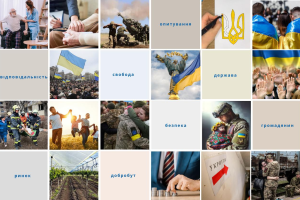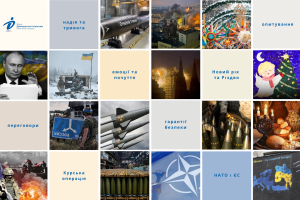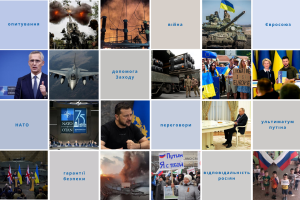Ukraine-Russia: What should be the format of future relations?

Research conducted by the sociological service of the Razumkov Center jointly with the Ilko Kucheriv Democratic Initiatives Foundation from December 16-20, 2016 in all regions of Ukraine, with the exception of Crimea and the occupied territories in the Donbas and Luhansk oblasts. At total of 2,018 respondents ages 18 and above were polled, The theoretical margin of error does not exceed 2.3%.
The polling was conducted with the support of the MATRA project of the Embassy of The Netherlands.
- Nearly half of the population of Ukraine (49%) feels that the normalization of relations between Ukraine and Russia is possible, but only in the distant future. People in the Donbas region (63%) and in central Ukraine (52%) believe the most that in the distant future the situation between the two countries will be normalized, while people living in the western and southern regions of the country believe in this the least (43% and 42% respectively). At the same time, only every tenth Ukrainian surveyed believes in the possibility of normalization of bilateral relations between Ukraine and Russia in the foreseeable future (10%), while nearly one fourth of Ukrainian citizens (24%) do not believe in such prospects. In the western regions of Ukraine 38% of the people are convinced that normalization of relations with Russia is impossible, while in the Donbas region only 15% of the population feels the same way. Finally, 17% of the respondents all over Ukraine were undetermined about their opinion regarding the prospects of normalization of relations between Ukraine and Russia.
- The majority of Ukrainian citizens are convinced that the normalization for relations with Russia is possible first and foremost on conditions of a change in power (i.e. the president) in Russia (47%), the cessation of military actions and de-occupation of the Donbas region (43%) and the return of the annexed Crimea to the jurisdiction of Ukraine (31%). In comparison, an insignificant part of the surveyed Ukrainian citizens believe that the normalization of relations with Russia will happen if pro-Russian politicians and political forces come to power in Ukraine (8%), without any conditions (8%) or on condition of increased pressure on Ukraine on the part of western countries in this vector (5%). Alongside, 15% of the surveyed could respond at all on the issue of the conditions on which the normalization of relations with Russia is possible.
- The most supported variant of Ukraine’s policy towards Russia (35% of the population surveyed) at the current stage envisages maximum limitation of contacts, suspending any form of collaboration, preserving the sanctions against Russia and introduction of the visa-free regime for Ukrainian citizens. The support of citizens of this variant of government policy is the highest in the West (54%), while support of citizens living in the South and East of Ukraine is the lowest (24%). Slightly more than a fourth of Ukrainians (28%) support the variant of limited cooperation in highly critical spheres, preservation of contacts and maintaining bilateral dialog, but they feel that delineating the so-called “red lines” of a compromise is impossible.* Only 15% of the surveyed are ready to justify the search for any compromises with Russia with the aim of regulating the conflict and returning to amicable partner relations. In any case, those that are most oriented towards finding a compromise with Russia live in the South (30%) and in the East (29%), while in the West and Center of the country only 5% and 7% of the surveyed, respectively, support this idea. A significant part of the surveyed (21%) was undetermined as to the best way that Ukraine can interact with Russia in the current conditions.
* The “red lines” are the limits for compromise in the spheres of political dialog, security, and humanitarian issues that should not be crossed by Ukraine within the framework of the implementation of the Minsk Agreements.








